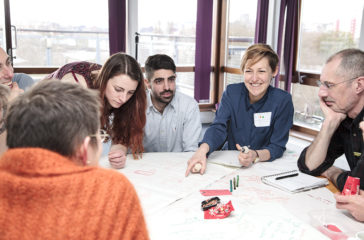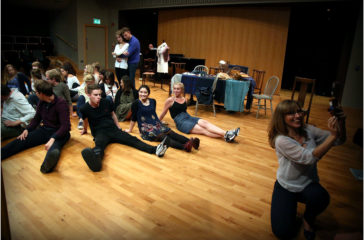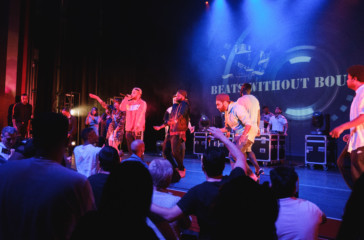Read the next in our series of Q&A’s with participants for Producer Farm 2018, a residency which provides time and space for contemporary performance producers to refresh their current practice, and consider their future potential.
Kirstin Shirling (London) specialises in producing work that brings together artists and communities in a shared creative experience. Kirstin has worked in creative engagement with a wide variety of Arts organisations, which include companies such as The Young Vic, V&A Museum, Barbican and Guildhall Creative Learning, Good Chance Theatre, Fuel, Belarus Free Theatre and Clean Break.
1. What challenges do you encounter within your area of producing?
Preconceptions, expectations, assumptions, box ticking, process versus product, ethics and morals, reporting and evaluation, capturing data, language, fundraising, target and output setting, ego, risk taking, “other-ing”, parachuting in, legacy, preconceived notions, industry perceptions, finding ways to talk publicly about sensitive work, sometimes getting things totally wrong. And, despite all this, convincing everyone to come along for the ride.
2. Why did you apply for Producer Farm and what do you hope to get out of it?
When I look at the world around me I see an ever-increasing rhetoric of fear and division. Communities are dividing, and individuals are reduced to sweeping generalisations and clichés.
I believe in the power of theatre as a vessel to cultivate dignity, instigate dialogue and make change. Creativity can bring people together over a shared skill or moment. It can inspire, provoke, inform, relax or enrage us. It has the potential to defy language, age, and cultural barriers; through art – new forms of expression and communication can be discovered. Storytelling is part of what makes us human and I want to fill the world with as much humanity as possible.
At its very core, my work is about instigating human connection and I will continue to devote my energy to meeting people, learning, being curious and inspired by those around me. Producer Farm will give me the time and space to stretch myself further, question my own assumptions and most importantly, learn from my peers. I feel it’s vital to continue to push and challenge ourselves and I’m grateful and excited to be provided the opportunity to examine what I can do to create change in the world I live in.
3. Can you tell us about an event you have been to which has made you think differently?
Earlier this year in Australia, while working on the tour of Barber Shop Chronicles, I met Charles, who was raised in Sydney and is of Tongan descent. After a stint inside the prison system, he decided to make a change and dedicate himself to helping young people transform the way they view education.
He taught himself barbering skills on YouTube and trained to be a youth worker. After opening a barber shop at the back of his house, he now trains and mentors young people within the barber shop space. Barbing has become the medium for him to create change in his community and provide a space for people to come together. Much of this ethos is echoed in Inua Elams’ play, Barber Shop Chronicles.
After meeting Charles, initially for a media story, the cast of Barber Shop Chronicles went back (without the cameras) to spend the day with Charles, get haircuts, share food and talk. Despite different cultural backgrounds, the ease at which everyone found common ground was startling and unforgettable. It was a day like no other. From this encounter, cross-cultural friendships and genuine connections based on mutual respect were formed and continue to this day.
This story is an important reminder to me to stay alive to creative engagement opportunities, they are everywhere and not just in education packs and workshops.
Producer Farm is a partnership with Dance Umbrella, Bristol Old Vic FERMENT, Fuel, Coombe Farm Studios & In Between Time








